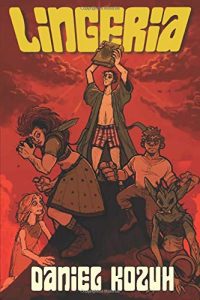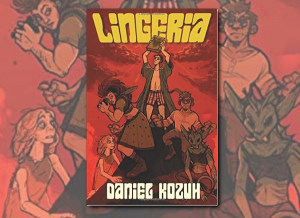LINGERIA: BOOK ONE OF ONE by Daniel Kozuh (Book Review)
 Lingeria: Book One of One by Daniel Kozuh is the story of Norman Halliday, author of the Lingeria series of fantasy novels. Norman hates himself and his books. When he wrote the first Lingeria novel, he thought it was a standalone. His publisher informed him otherwise. As a result, he spent his whole career writing in a setting he disdains, watching his other endeavors fail, and spiraling into the despair of a man who feels like he wasted his life. In fact, he’s so disengaged from his books that he relies on an unofficial fan encyclopedia to keep his continuity straight.
Lingeria: Book One of One by Daniel Kozuh is the story of Norman Halliday, author of the Lingeria series of fantasy novels. Norman hates himself and his books. When he wrote the first Lingeria novel, he thought it was a standalone. His publisher informed him otherwise. As a result, he spent his whole career writing in a setting he disdains, watching his other endeavors fail, and spiraling into the despair of a man who feels like he wasted his life. In fact, he’s so disengaged from his books that he relies on an unofficial fan encyclopedia to keep his continuity straight.
His bloodshot eyes panned over the framed blow-ups of his previous fourteen Lingeria novel covers that lined his agent’s spacious office. The first, simply titled Tales of Lingeria, featured a large-breasted Amazonian warrior decapitating an orc (an event that didn’t even occur in the book) sandwiched between the title of the book above and his own name below.
A quick scan of the posters proved to be like a zoetrope, with the word “Lingeria” growing larger and larger and Norman’s name shriveling smaller and smaller. It was the 3rd book, Tales of Lingeria: The Palladium Gauntlet where Norman’s name became N.T.T. Halliday. The first T stood for Thomas, the second T stood for Norman’s willingness to sacrifice his integrity to sell a few hundred more copies of his book.
At the start of the novel, Norman is at his lowest point, and attempts to commit suicide by sticking his head in the oven. The attempt goes awry, however, when the back wall of his oven opens up into a Whittle’s kitchen (Whittles are Norman’s species of shameless hobbit rip-offs). There he meets Roe, a recurring side character in the Lingeria series, and learns that the first three books in the series have made their way into Lingeria, where they are treated as the holy scriptures of the creator god, which is to say, Norman. To complicate matters, the timelines diverge; the Lingeria he’s stumbled into hasn’t lined up with his novels since around Book 8, meaning that there are plenty of surprises in store for him and his knowledge only goes so far. He also learns that a Black Cloud is tearing Lingeria apart, destroying land and sucking the life out of anyone it touches. Norman isn’t happy about it, but he decides to help fix the situation.
The humor remains closely tied to the premise, which is something I love to see in a comedy. It goes beyond the easy jokes and fleshes out the idea of an artist trapped in his own creation, uncomfortable being treated as a god, and torn between wanting to go home to the real world and feeling a sense of responsibility. The characters he meets all have different answers to the age-old question: What would you say if you met your Creator? My favorite answer came from a warrior with a grimdark backstory:
He stood up and waved like a goober. He exited the grove; stepping high to avoid roots and ivy. He looked up and saw that Tahra was walking to greet him as well, at a rather excited pace. Her face was locked onto him, her expression bullish. When she was within a few feet of Norman, he extended his hand. “Hi, you must be…,” and that was all he could get out before she broke his nose.
The premise of a man sucked into a world he knows isn’t real evoked Thomas Covenant, and the decaying world reminded me of Link’s Awakening or The Neverending Story. The book also delved into some other interesting themes that took me by surprise, like the tragedy of meeting your heroes and the question of who has the greater claim to a piece of pop culture. Is it the creator or the fans? Does the answer change when the creator is clearly checked out? Like I said, this comedy took a deep dive into its ideas, which is a great reason to write a satire.
On the negative side, I had two major complaints that hurt my enthusiasm for this one. First, and this is a bit spoilery, I found the ending to be unsatisfying. One last major conflict is introduced and resolved in the final chapter, and not even in a way that felt like a joke to me. The other big one was the copy edit. These days, I’m used to finding one or two typos or formatting errors in any book I read (for a fun game, see how many you can find in this review). I flagged closer to 20 here. I’d love to see this book cleaned up.
Overall, I thought this was a funny book that did a good job mining its concept for humor. Unfortunately, there were a couple issues I couldn’t ignore that hold it back from a full recommendation.

